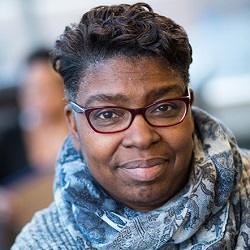Why This Degree is For You
If you have a passion for the arts but think there’s no way you can make a living in the field, think again. The Arts Production & Management program gives you the skills you need to take charge in the arts industry.
Program Type
Locations/Format
Cost
Typically $1,234 per semester
Tuition & Fees
Class Requirements
77 credit hours
Students who lorem ipsum dolor sit amet, consectetur adisipig elit.
Quick Links
Trauma-Informed Certificate
The University of Baltimore’s Trauma-Informed Certificate is the only certificate program of its kind designed specifically for criminal justice professionals. This post-baccalaureate certificate is ideal for you if you currently work or plan to work in the criminal justice field.
At the completion of this program, you will:
- understand the foundations and manifestations of trauma
- understand the impact of trauma within criminal justice organizations
- have the skills and tools necessary to address the consequences of trauma and make appropriate referrals for treatment services.
What does it mean to be trauma-informed?
Being trauma-informed generally means being sensitive to the impact that trauma may have on a person. A trauma-informed criminal justice professional can increase his or her own safety as well as the safety of the individual they are interacting with in the system, and reduce that individual’s risk for re-traumatization by the system.
The rates of trauma and post-traumatic stress disorders are high among individuals involved in the criminal justice system. Thus, an understanding of trauma and its impact, as well as the principles of trauma-informed practice, are key for today’s criminal justice professionals.
 “The information I gained from my trauma-informed classes has been invaluable in my
work as a case manager.”
“The information I gained from my trauma-informed classes has been invaluable in my
work as a case manager.”
Sonce Reese, B.S.'15, CERT'15, CERT'19, M.A.'20, earned her B.S. in Forensic Studies, Certificate in Crime Scene Investigation, Trauma-Informed Certificate and M.A. in Global Affairs and Human Security, all from The University of Baltimore
Everything you need to know about the Trauma-Informed Certificate.
Graduate Certificate Requirements (12 credits)
- CRJU 680 Foundations and Impact of Trauma
- CRJU 682 Trauma-Informed Organizations
- CRJU 684 Responding to Trauma
- CRJU 686 Trauma Interventions and Best Practices
Classes are offered evenings.
Admission Requirements
The following materials are required for admission into the Trauma-Informed Certificate program:
- Online application. Complete and submit the online application and pay the $50 application fee. Questions about the application should be directed
to the Office of Graduate Admission (410.837.6565).
- Personal statement. Detail your reasons for seeking a graduate certificate, your short-and long-term professional
and personal goals, and how you think this certificate will help you achieve those
goals. Please limit your statement to one page of text. Send the statement to documents@ubalt.edu.
- Official transcripts. Request that an official transcript of all prior college or university work (including
graduate transcripts, if any) be sent directly from each institution attended. Applicants
to the Trauma-(nformed Certificate program are required to have a minimum GPA of 3.0.
Transcripts can be sent electronically to documents@ubalt.edu.
- Writing sample. Submit a sample of your writing, such as a completed term paper, etc. to dcouments@ubalt.edu.
**Undergraduate students with a grade point average of 3.0 or better can contact the program director to be considered for early entry into the program.
Roper Victim Assistance Academy of Maryland
In partnership with The University of Baltimore's School of Criminal Justice, the Roper Victim Assistance Academy of Maryland is a 40-hour, academically-based education and training program that covers a broad array of topics in victimology, victim's rights and services and victim advocacy throughout the criminal and juvenile processes. Led and coordinated by School of Criminal Justice executive director Debra L. Stanley, the award-winning academy also sponsors advanced trainings for victim service professionals and victim advocates and provides additional networking opportunities through its alumni association.
WHY UBALT IS FOR YOU
EMPOWERING YOUR FUTURE
When you graduate, you’ll be prepared to work for businesses, nonprofit organizations and government agencies that deal in, represent or interact with artists and the arts—perhaps in addition to managing your own freelance artistic career. You’ll also be well prepared for graduate-level study in business and the arts.
You’ll take courses in:
- arts production and performance
- history, appreciation and analysis of the arts
- government and business as they relate to the arts
- technology’s impact on and importance to the arts.
With UBalt’s location between the Station North Arts and Entertainment District and the Mount Vernon Cultural District, the neighborhood is your laboratory, and this program will allow you opportunities to work with the city’s theaters, museums, galleries, musical venues and arts advocacy groups, shadowing and assisting artists, attending exhibits and performances, and interning with an artist or arts-related organization.
What Our Graduates Do
Common Roles
- Theaters, museums, and galleries
- Music venues
- Advocacy groups










